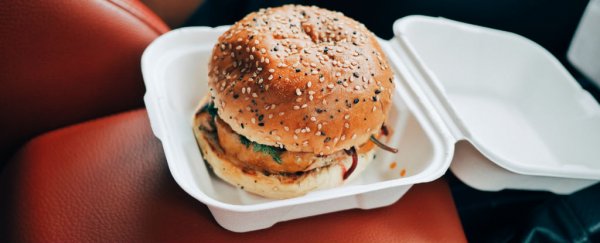Scientists think they know why pizza shops and burger chains do such a great trade after the bars shut, and it's as much to do with our brains as it is with our stomachs.
A new study has found that alcohol activates a certain protein in the brain that's been linked to appetite, and it could be acting as a trigger for the post-drink munchies.
To figure this out, researchers from the Francis Crick Institute in the UK injected alcohol into the abdomens of mice once a day for three days. The daily amount given was roughly the equivalent of two bottles of wine or 10 beers, if the mice were humans.
Over the three days, mice of both sexes ate significantly more than the control group that wasn't given alcohol – up to 25 percent more food in some cases.
The extra eating was especially pronounced on day two, though the researchers aren't sure why.
In addition to measuring the volume of food consumed, the researchers examined the activity of the agouti-related protein (AgRP) neurons in the brains of the mice – a protein that's previously been linked to their feeding cycle.
When this protein is activated, mice are more likely to eat, and when it's deactivated, mice tend to stop eating.
The team saw more electrical activity in the AgRP neurons when the mice had been drinking, suggesting a link between the two. And when the effects of AgRP were suppressed, the connection was broken and alcohol's effect on appetite was no longer noticeable.
We can't be certain that the same activity occurs in humans when we go on a serious drinking session, but we do have the same AgRP-powered hunger controls in our brains, so it's a plausible idea.
The link between drinking and over-eating in humans has already been well established – you may have experienced it yourself last weekend – but what's less clear is why booze prompts us to eat more, especially as alcohol is already stuffed with calories.
Previous research looking at drinking and eating in humans has found that alcohol can make our brains more sensitive to the aroma of food, but the latest evidence suggests there's more going on here.
And getting to the bottom of the mystery is more urgent than you might think, as alcohol is increasingly being linked to obesity and health problems that go beyond a few extra slices of pizza in the early hours now and then.
As one of the researchers, Sarah Cains, told Catherine Caruso at Scientific American, this study ties obesity and alcohol intake together, and now we need to figure out why.
"[The study] shows that if you have an increased alcohol intake, then you're going to, as a result of that through the effect of alcohol on your brain, have an elevated level of food intake."
The findings are published in Nature Communications.
